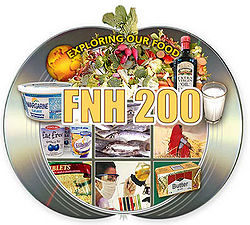Course:FNH200
| FNH200 Exploring our Foods | |
|---|---|

| |
| Course Info | |
| Instructor: | Judy Chan |
| Class Time: | T Th 9 to 10:50 am |
| Teamwork Time: | T Th 11 to 11:50 am |
| Format: | Online and Team |
| Office Hours: | By appointment via email |
| Course Syllabus: | Course Syllabus |
| Past Projects: | Team Projects 2011-21. |
| 2025 Summer Online | |
| Course Lessons | |
| 2024 Summer Online | |
| 2023 Summer Online | |
| 2022 Summer Online | |
| 2021 Summer (July - Aug) | |
| 2020 Summer (July - Aug) | |
| 2017 Summer (July - Aug) | |
| 2015 Winter (2016 Jan to April) | |
| 2014 Winter (2015 Jan to April) | |
| 2013 Winter (2014 Jan to April) | |
| 2012 Winter (2013 Jan to April) | |
| 2011 Winter (2012 Jan to April) | |
| 2010 Winter (2011 Jan to April) | |
Course Description
Students are introduced to chemical and physical properties of foods; issues pertaining to safety; nutritive value and consumer acceptability of food, food quality and additives; food preservation techniques and transformation of agricultural commodities into food products; foods of the future.
This course is required in the Food, Nutrition and Health Program and will also be of value to students in other programs in the Faculty of Land and Food Systems, or in other disciplines including those in the life sciences, health care professions, human kinetics or physical education, who wish to enhance their understanding of the science of food.
Course Objectives
After completing this course, successful students will be able to:
- Describe tissue-based (both plant and animal) food systems, fluid food systems and various dispersions important to food quality;
- Describe the role of chemical reactions, enzymes, and microorganisms in food spoilage, food preservation and food-borne disease;
- Describe the regulations and agencies that are in place to ensure the quality and safety of the Canadian food supply;
- Describe food processing methods and their application in the conversion of raw materials into food products;
- Develop personal food selection and food handling habits that will minimize your risk of contracting food-borne or water-borne disease;
- Illustrate the importance and role of chemical reactions, enzymes and micro-organisms in food spoilage, food preservation and food-borne disease;
- Describe various types of food processing and packaging systems;
- Understand the need for and appropriate applications of food processing;
- Rationalize and articulate a personal set of values related to your decisions pertaining to selection of food products;
- Demonstrate an ability to critically evaluate the validity of information that commonly appears in newspapers, magazines, radio, television, and internet.
Note to students enrolled in FNH 200:
There are multiple sections for FNH 200. This Course Wiki is developed for students registered in sections facilitated by Judy Chan. Other instructors may have minor modifications in their course content and adapted different content engagement and assessment strategies. Students registered in other sections should contact their instructors for specific information.
Authorship:
FNH 200 Course content on this wiki page and associated lesson pages was originally authored by Drs. Brent Skura, Andrea Liceaga, and Eunice Li-Chan. Ongoing edits and updates are contributed by past and current instructors including Drs. Andrea Liceaga, Azita Madadi-Noei, Nooshin Alizadeh-Pasdar, and Judy Chan.
|
|